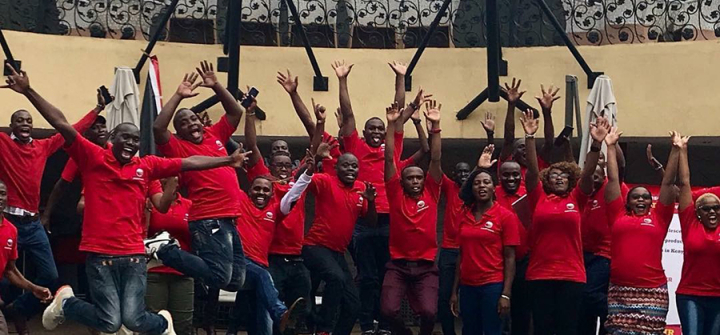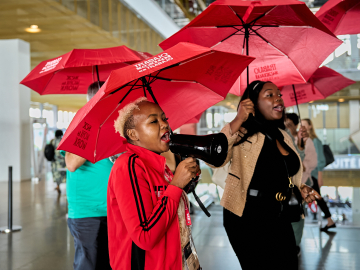Countdown to Kigali: 5 Things to Watch for at #ICFP2018
Many delegates will trickle into Kigali, Rwanda this weekend for the 5th International Conference on Family Planning with little fanfare—but the youth are already starting to steal the show, with a virtual youth relay that started in Mombasa, Kenya earlier this week.
The relay, led by the Kenya Adolescent and Youth Sexual Reproductive Network, will culminate in a youth declaration pushing for accountability to be presented at the conference. It’s just one way youth are shaping the agenda of the world’s largest family planning conference, cohosted this year by Rwanda’s Ministry of Health and the Bill & Melinda Gates Institute for Population and Reproductive Health at the Johns Hopkins Bloomberg School of Public Health from November 12–15.
GHN will be there to cover the proceedings on our conference blog, through special exclusives in our ewnewsletter (subscribe here) and on Twitter: @ghn_news.
Here are 5 things we’ll have our eye on:
#1 Rwanda’s Success, Ripe for Replication
ICFP organizers chose Rwanda in part to showcase the country's accomplishments in family planning and related public health efforts, says Gates Institute Director Jose “Oying” Rimon II.
Rwanda dramatically increased the use of modern contraceptive methods, leading to a drop in the total fertility rate from 6.1 to 4.6 between 2000 and 2010, according to Rwanda’s Minister of Health, Diane Gashumba.
The spotlight on Rwanda holds special meaning for Jean Christophe Rusatira, MD, MPH, a Gates Institute program officer from the country. “Setting ICFP in Rwanda is sign of recognition and encouragement of the efforts of our community’s progress,” Rusatira says. Rwanda’s hilly landscape makes it hard to reach the most rural populations, but more than 60,000 community health workers met that challenge and helped increase contraceptive uptake from 10 to 49% in just 15 years.
“This is a big achievement that deserves recognition and celebration,” he says.
********
#2 The Youth Have Got This
While government ministers, researchers and international family planning advocates regularly attend, the sizable youth contingency—about 600 of the 3,700 delegates—will set this year’s event apart.
And they’re not just riding along—they’re driving the agenda, organizing and running Tuesday’s plenary session. This new generation of family planning and reproductive health leadership brings “energy, creativity, enthusiasm, and passion to the reproductive health community,” Rimon said. “Mark my words: The young people are taking over and leading the charge.”
Rusatira looks forward to seeing many more Rwandan youth present at this conference. He’s been to the last couple ICFPs but only with a couple other young Rwandans. “I look forward to seeing young Rwandans make the ICFP an event that values and expresses the vibrancy of youth,” he told GHN in an email from Rwanda.
#3: The Returns Will Last a Lifetime
This year’s conference theme spells out family planning’s long-term benefits: “Invest in Family Planning for a Lifetime of Returns.”
“If you invest in family planning, you not only empower women to have more control over their lives, you reduce mothers dying by up to 50%. You reduce infant and child death in a big way—30%—while creating opportunities for economic growth and wellbeing—including addressing climate change,” Rimon said.
#4 Decade of the Demographic Dividend
#ICFP2018 will also highlight the demographic dividend—the opportunity for economic growth and welfare seen when fertility declines, and people in the workforce outnumber dependents. African heads of state have declared 2020-2030 the Decade of the Demographic Dividend, and we can expect discussion throughout the conference on how to prepare for this at the policy and ministerial levels.
#5 Who Is Accountable—and Who Is Keeping Count?
#ICFP2018 is also about next steps toward the goal of enabling an additional 120 million women and girls access to voluntary, quality contraception by 2020—and who is stepping up. Accountability and advocacy threads run through the entire conference, aimed at inspiring governments to make and keep public commitments. To bolster that discussion, look for FP 2020’s new report with data on contraceptive access and use in the world’s 69 poorest countries. And, since advocates need to know how to harness and use data to keep tabs on progress and setbacks and hold governments accountable, several sessions aim to help them build up data-crunching and tracking skills.
Other highlights:
- FPitchfest: A transformational family planning and reproductive health idea will be pitched, chosen and funded.
- Recognizing Leaders: See who will be honored with the Global Humanitarian Award for Women’s and Children’s Health—given to someone who has used their private wealth to advance women and children’s health. In addition, EXCELL awards will recognize leadership excellence at the country, organizational, team and individual level.
- A Star-Studded Red Carpet: Wellbeing Foundation Africa President Toyin Saraki, Princess Sarah Zeid of Jordan, and musician Knowless will lend their starpower to the conference. And, a Women of Impact panel—featuring high-profile global leaders including Saraki, Zeid, First Lady of the Republic of Rwanda Jeannette Kagame and First Lady of Haiti Martine Moise—will address how to create a culture that empowers women to become positive disruptors.
- Be There Virtually: If you can’t make it to Kigali next week, you don’t have to miss out completely. Many parts of the program will be available via the virtual program and livestream available on the ICFP conference hub website.
Global Health NOW’s Dayna Kerecman Myers, with Gates Institute support, is among the journalists reporting from Rwanda at the 2018 ICFP. Check back every day this week for exclusives from the conference, and follow our conference blog here.
Join the tens of thousands of subscribers who rely on Global Health NOW summaries and exclusive articles for the latest public health news. Sign up for our free weekday enewsletter, and please share the link with friends and colleagues: http://www.globalhealthnow.org/subscribe.html
Members of the Kenya Adolescent and Youth SRHR/HIV Network, which is leading a virtual youth relay from Kenya to Kigali this week, pictured here at a past event. Image: Courtesy





